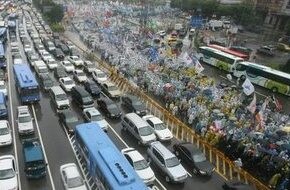hankyoreh
Links to other country sites 다른 나라 사이트 링크
S.K. freedom of assembly questioned

The Seoul Metropolitan Police Agency banned the nation’s two major umbrella labor groups, the Korean Confederation of Trade Unions (KCTU) and the Federation of Korean Trade Unions (FKTU), from holding a scheduled demonstration in Sejongno, central Seoul, citing traffic congestion. The move has again raised controversy that South Korean measures for cancelling demonstrations violate the freedom of assembly guaranteed by the country’s constitution.
Article 12 of the demonstration law has been called into question by experts, who say the law can be interpreted arbitrarily and thus goes against international standards, a criticism echoed by the U.N. Human Rights Committee for several years.
The FKTU planned to hold a rally at Gwanghwamun on November 12, while the KCTU was to take to the streets with some 30,000 members in Jongno on November 25.
"Until now, the violence when coping with the rallies and demonstrations has become a problem, but the inconvenience caused by serious traffic jams is becoming a social issue. Considering this, we decided to ban the labor groups’ demonstrations," said Kim Jeong-seok, an official of the police agency.
When asked about the designation of traffic as a "social issue," Kim said that "media reports have pointed out the inconvenience suffered by citizens, and legislators repeatedly raised the problem at parliament." Earlier, chief of police Lee Taek-soon said in September that he would seek measures to ban all demonstrations in central areas of Seoul to prevent traffic congestion and other disruptions.
However, complaints have been raised that the police have no clear principles set out regarding the allowing or banning of demonstrations. About 15,000 members of the Coalition of Dump Truckers Unions were permitted to hold a rally in Daehangno, central Seoul, on October 13. The police said it decided to permit the truckers’ rally because the event blocked only three lanes of the road. The police, however, have banned a "noraebang" (Karaoke room) operators’ rally scheduled for November 20 to 23 in central Seoul, which needs just two lanes of the road.
Article 12 of the demonstration law originally allowed authorities to prohibit rallies that could cause serious traffic jams in central city districts, while in case of orderly marches, the police could not exercise a ban. A 2004 amendment of the law, however, has given the police a freer hand in prohibiting any demonstrations that could "cause serious traffic concerns."
Even in 1999, before the amendment, the U.N. Human Rights Committee worried that Article 12 limits freedom of assembly too broadly. During a conference held last month, the U.N. committee questioned the South Korean government regarding the level of freedom of assembly in the nation. The committee urged Seoul to give it detailed information on demonstrations that were banned in the nation, and why.
A lawsuit against the amended law filed by the People’s Solidarity for Participatory Democracy is currently being reviewed in court.
"As the conception of Article 12 is unclear, the police cannot help but use it arbitrarily," noted lawyer Jang Yu-sik. "If we leave this problem to the discretion of the police, all demonstrations would be held through a system of getting a permit in advance, which violates a fundamental right [of assembly] guaranteed by the Constitution," added Jang.
Editorial・opinion
![[Correspondent’s column] China-Europe relations tested once more by EV war [Correspondent’s column] China-Europe relations tested once more by EV war](https://flexible.img.hani.co.kr/flexible/normal/500/300/imgdb/original/2024/0628/7617195640940814.jpg) [Correspondent’s column] China-Europe relations tested once more by EV war
[Correspondent’s column] China-Europe relations tested once more by EV war![[Correspondent’s column] Who really created the new ‘axis of evil’? [Correspondent’s column] Who really created the new ‘axis of evil’?](https://flexible.img.hani.co.kr/flexible/normal/500/300/imgdb/original/2024/0628/4017195633070654.jpg) [Correspondent’s column] Who really created the new ‘axis of evil’?
[Correspondent’s column] Who really created the new ‘axis of evil’?- [Editorial] Exploiting foreign domestic workers won’t solve Korea’s birth rate problem
- [Column] Kim and Putin’s new world order
- [Editorial] Workplace hazards can be prevented — why weren’t they this time?
- [Editorial] Seoul failed to use diplomacy with Moscow — now it’s resorting to threats
- [Column] Balloons, drones, wiretapping… Yongsan’s got it all!
- [Editorial] It’s time for us all to rethink our approach to North Korea
- [Column] Why empty gestures matter more than ever
- [Editorial] Seoul’s part in N. Korea, Russia upgrading ties to a ‘strategic partnership’
Most viewed articles
- 1Dreams of a better life brought them to Korea — then a tragic fire tore them apart
- 2Yoon echoed conspiracy theories about Itaewon disaster, former National Assembly speaker says
- 3[Correspondent’s column] Who really created the new ‘axis of evil’?
- 4Son Heung-min’s father, brother accused of child abuse at football academy
- 5S. Korea joins US, Japan for first multi-domain drills at a time of escalating tensions
- 6Moscow tells Seoul to rethink ‘confrontational course’
- 7[Correspondent’s column] China-Europe relations tested once more by EV war
- 8Full text of Lee's inaugural speech
- 946% of cases of violence against women in Korea perpetrated by intimate partner, study finds
- 10[Guest essay] Amending the Constitution is Yoon’s key to leaving office in public’s good graces